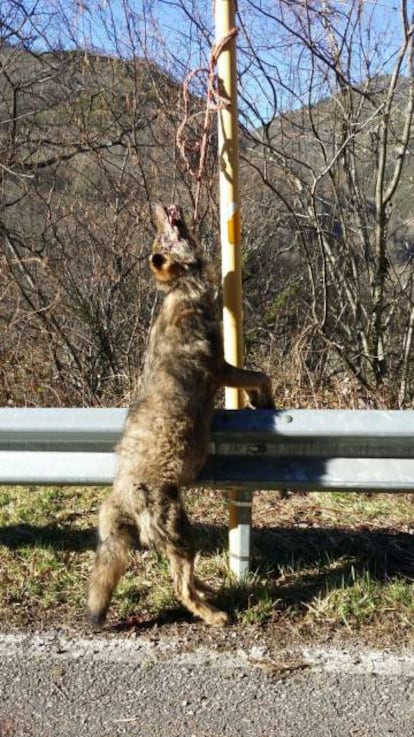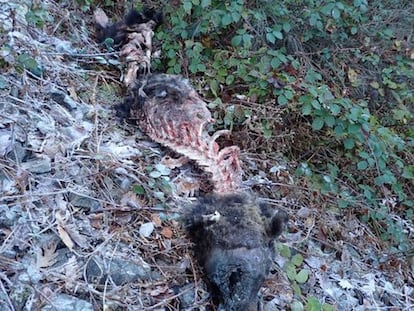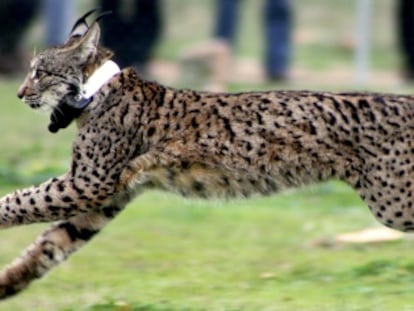The mystery of Spain’s dead wolves
State Attorney’s office to investigate displaying of cadavers in northern region of Asturias

The environmental division of Spain’s State Attorney’s office is to investigate the displaying of Iberian wolf cadavers in public places in the northern region of Asturias, where three cases have been reported in recent days, the last strung up from a traffic sign.

The investigation has been opened after the World Wildlife Fund (WWF) sent a letter on February 27 to the State Attorney’s office saying that the killing and display of the animals was creating “a situation of impunity and alarm.”
The WWF says that over the last year up to nine Iberian wolf bodies have been found in the mountainous region by roadsides, on bridges, in a supermarket car park, and even in the vehicle of a regional park ranger.
“This is an exercise in obscene exhibitionism,” says Alberto Fernández, a biologist with the Spanish National Research Council (CSIC) and a member of ASCEL, an association dedicated to the study and conservation of the Iberian wolf.
“Who are they sending a message to? I don’t know: society at large,” he adds.
For park ranger Xurde Gayol, however, the answer is clear: “I think the message is for the authorities and environmentalists. These [displays] have become a trend,” he says.
Culling wolves is the sole responsibility of the authorities: hunters are forbidden from doing so, but to date nobody has been found responsible for the attacks on the animals.
This is an exercise in obscene exhibitionism Alberto Fernández, biologist
Farmers and local mayors complain that authorities only killed 29 animals from January 2016 to February 2017 while the upper cut-off is 45 wolves. The latest census shows there are 38 packs or family groups in Asturias.
“Farmers don’t think we kill enough wolves, while for environmentalists the figure is too high,” says Manuel Calvo, Director General of the Asturias National Resources Department.
Roberto Hartasánchez, president of Spain’s Fund for the Protection for Wild Animals (Fapas), accuses the regional environmental department of Asturias of failing to manage its wolf population. “Everyone does what they want,” says the environmentalist, who has filed complaints in the wake of earlier cases of dead animals being strung up along the region’s roadsides.
Regional environmental authorities in Asturias passed the most recent appearance of a wolf cadaver, which was found on February 26 in Teverga, in the south of the region, to Seprona, the Civil Guard’s environmental department, but the agency did not investigate the incident, saying no complaint had been formally made.
Just days earlier, two other examples of the protected species were found dead in a parking lot in the village of Arriondas.
Seprona, has, however, formally questioned 20 people – nine farmers and 11 park rangers – as part of an investigation into the alleged falsification of wolf attacks carried out in order to fraudulently claim government compensation. Public prosecutors say defendants doctored photographs of “damage that didn’t actually exist” in what authorities believe could constitute systematic criminal fraud.
The Civil Guard says some €200,000 was falsely claimed in compensation and that these false attacks could have “played a role in generating an atmosphere of [social] rejection” of Iberian wolves.
English version by George Mills and Nick Lyne.
Tu suscripción se está usando en otro dispositivo
¿Quieres añadir otro usuario a tu suscripción?
Si continúas leyendo en este dispositivo, no se podrá leer en el otro.
FlechaTu suscripción se está usando en otro dispositivo y solo puedes acceder a EL PAÍS desde un dispositivo a la vez.
Si quieres compartir tu cuenta, cambia tu suscripción a la modalidad Premium, así podrás añadir otro usuario. Cada uno accederá con su propia cuenta de email, lo que os permitirá personalizar vuestra experiencia en EL PAÍS.
En el caso de no saber quién está usando tu cuenta, te recomendamos cambiar tu contraseña aquí.
Si decides continuar compartiendo tu cuenta, este mensaje se mostrará en tu dispositivo y en el de la otra persona que está usando tu cuenta de forma indefinida, afectando a tu experiencia de lectura. Puedes consultar aquí los términos y condiciones de la suscripción digital.










































